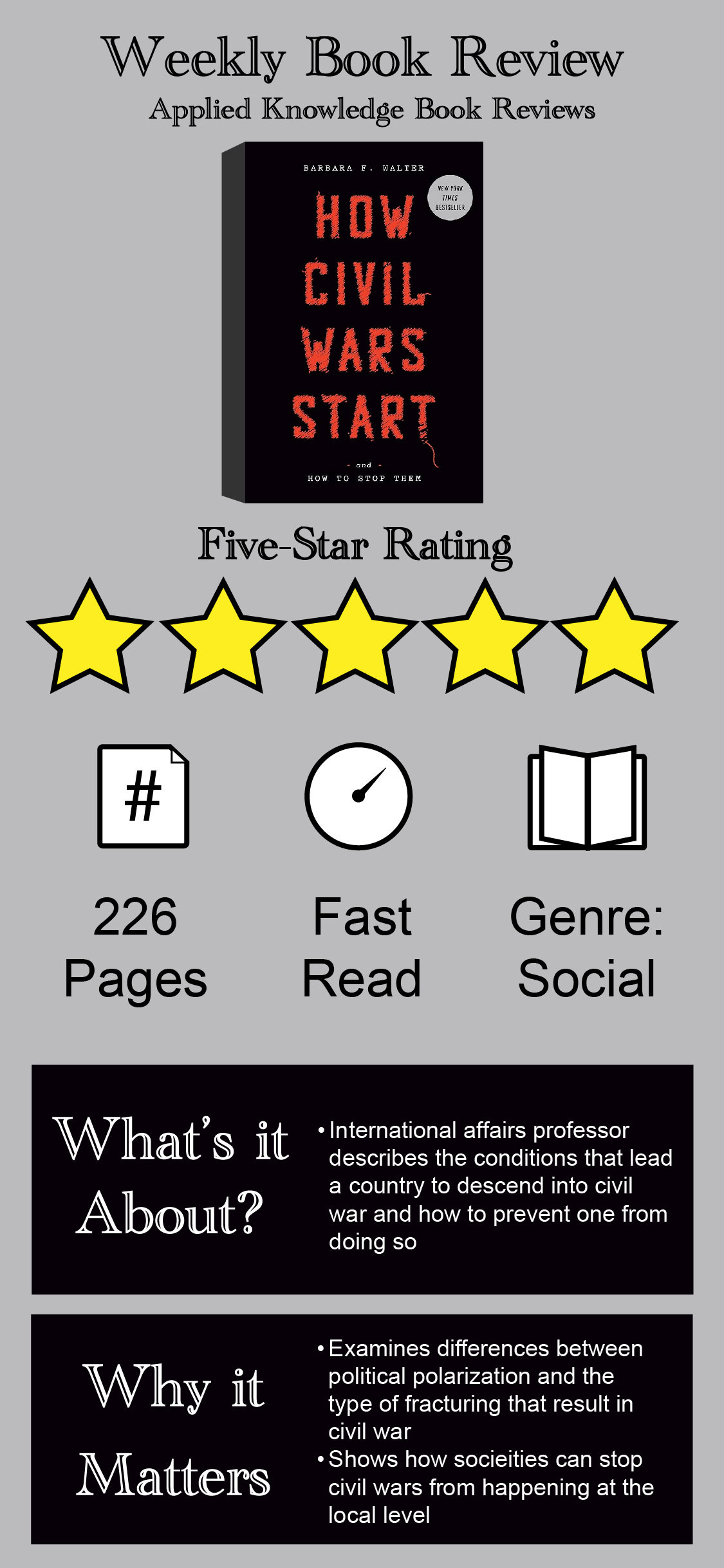America Isn't Headed Towards a Civil War. Here's How That Could Change.
It takes more than political polarization to spark a civil war. Barbara Walter explains what makes a civil wars likely across cultures.
Even though American politics is polarized and toxic, the country isn’t on its way to civil war. A country’s citizens fighting each other requires more dramatic breaks with their neighbors than different political views, even if they’re seemingly incompatible.
Instead, civil war comes from a certain type of politics that separates itself from normal divisions about issues. It can come from an authoritarian party using its followers to fight democratic factions into submission. But there’s another factor that isn’t discussed well in much political analysis, which Barbara Walter ends her book How Civil Wars Start with:
“…political polarization does not increase the likelihood of civil war. What increases the likelihood of civil war is factionalization—when citizens form groups based on ethnic, religious, or geographic distinctions—and a country’s political parties become predatory, cutting out rivals and enacting policies that primarily benefit them and their constituents.”
Leaders like these aren’t creating policies that their side of the aisle agrees with. Instead, they’re using the government to grant special privileges to people who support them. It’s the flip side of using the government to punish dissidents.
The Dangerous Space Between Democracy and Autocracy
For people worried about a civil war, the most dangerous form of government is one suspended between a free democracy and a brutal autocracy. A democracy is full of citizens disagreeing at the ballot box, and autocracies can put down rebellions with the full might of the state. But Walter points out that a country with no institutions to combat violent factions is at risk for civil war:
“Countries almost never go from full autocracy to full democracy without a rocky transition in between. Attempts by leaders to democratize frequently include significant backsliding or stagnation in a pseudo-autocratic middle zone. And even if citizens succeed in gaining full democracy, their governments don’t always stay there. Would-be despots can whittle away rights and freedoms, and concentrate power, causing democracies to decline.
The example of a country in this no-man’s land is Hungary. In 2011, it adopted a new constitution that redrew electoral districts for Prime Minister Viktor Orban’s party. The new constitution also gave some of the minority party votes to Orban’s party each election, keeping him in power through elections that have been fixed before any ballots are cast.
But there’s another layer to a country’s civil war risk. Political parties that group members by their identities instead of policy positions ensure that members of their party cannot leave. Policies can ebb and flow, but identity markers like ethnicity or culture can’t be so easily changed.
Sons of the Soil
Politicians who exploit these groupings lead “sons of the soil” movements. These leaders claim to represent the “real” members of the country who must retake power from people outside of their groups.
The “real” members of a country don’t really have a special claim to power, but they may have fallen on hard times while other groups have gained wealth and status. For example, “sons of the soil” politicians in the United States appeal to white rural Christians who struggled economically after manufacturing and coal jobs left their communities.
Walter points out that these people have seen other identity groups come from urban areas or abroad to achieve the American Dream that seems out of reach for so many rural Americans. Explaining their success with DEI or globalist conspiracies is an easy way for a leader to hack real emotions even if they’ve incorrectly assigned blame:
“The grievances of sons of the soil are often deeply felt, if not always legitimate. It’s what makes the appeals of political leaders such as Trump so effective. The leaders of the Provisional IRA tapped into Irish Catholics’ genuine anger at economic and political discrimination at the hands of Protestants. The leaders of Hamas tapped into Palestinians’ deep resentment at losing their land. The Republican Party, by embracing white Americans’ grievances, has become like other political parties that have championed sons of the soil movements around the world…”
There’s enough concern about blowback from people who believe they’re the only true Americans that critics are silencing themselves. On March 6, the New York Times published a story about the federal workers and Republicans who are afraid to speak out against Trump. Historian Niall Ferguson remarked how surprised and put off he was that he was called brave for publicly disagreeing with the vice president’s characterization of the war in Ukraine and Volodymyr Zelensky.
But as long as we maintain close ties with our neighbors, we can survive another four years of divisive politics without descending into civil war. Walter’s book is a warning, but it’s also reassuring to see the distance we still have between our civil society and its collapse.


